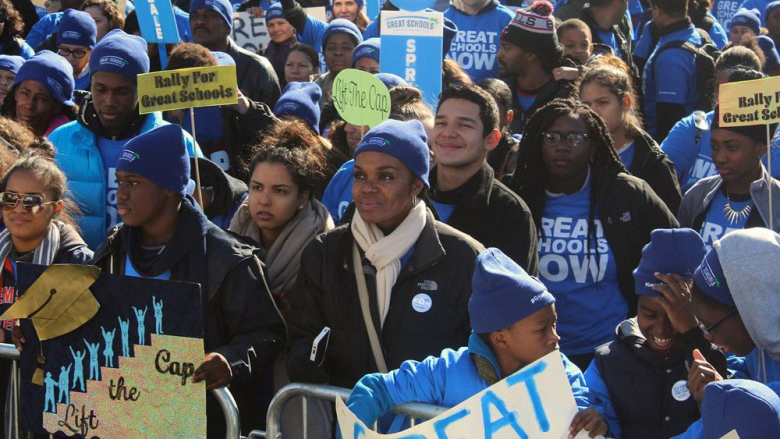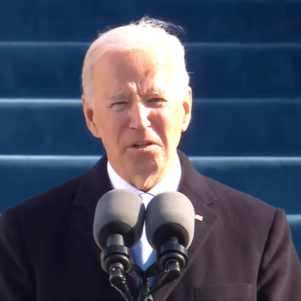High Court Weighs Charters as Solution to Education Adequacy
By State House News Service | October 2, 2017, 18:11 EDT
 Charter school supporters marched on Beacon Hill in November 2015 to demand that lawmakers lift the cap on the number of charter schools allowed in Massachusetts. Photo by Evan Lips for New Boston Post.
Charter school supporters marched on Beacon Hill in November 2015 to demand that lawmakers lift the cap on the number of charter schools allowed in Massachusetts. Photo by Evan Lips for New Boston Post.
By Matt Murphy
STATE HOUSE NEWS SERVICE
STATE HOUSE, BOSTON, OCT. 2, 2017…..Eleven months after voters rejected an expansion of charter schools in Massachusetts, that vote hangs over a lawsuit threatening to rekindle the debate over the merits of charter schools.
Supreme Judicial Court Chief Justice Ralph Gants, questioning an attorney for five Boston students challenging the legal rationale for caps on charters on Monday, raised the will of the voters as he pondered the role courts should play in making education policy decisions.
“We have the elephant in the room that more than 60 percent of voters in Massachusetts appear to have found there to be a rational basis for that,” Gants said.
The Supreme Judicial Court heard arguments in a case brought by students who were not selected in a lottery to attend a Commonwealth charter school in Boston, and therefore were forced to remain in underperforming district schools.
While the plaintiffs contend caps unfairly diminish their ability to obtain a constitutionally protected quality education, the attorney general’s office argued that it is the purview of the Legislature and the executive branch to make such policy decisions and that caps were imposed to protect local control and preserve funding for traditional district schools.
Attorney Kevin Martin, representing the students, argued the statutory limits preventing the Boston school district from spending more than 18 percent of its budget to send students to a charter school are “arbitrary and irrational.”
“This court exists for situations where the political process has broken and is leaving thousands of children behind,” he said.
Martin pointed to the fact that there is no similar cap in Boston on Horace Mann charter schools, which unlike Commonwealth charter schools must be approved by the local school committee and the faculty is represented by teachers’ unions.
“Theoretically, that exact same parade of horribles would apply with Horace Mann that are drawing students out,” Martin said, suggesting the presence of unions is the only reason the legislature hasn’t limited Horace Mann charters as well.
If decided in the students’ favor, the case would be remanded back to the Superior Court so that it can proceed to the discovery phase where the plaintiffs believe they can demonstrate that the cap does not further any justifiable public policy goal.
Suffolk Superior Court Judge Heidi Brieger dismissed the lawsuit challenging the constitutionality of charter caps last October before voters defeated a ballot question seeking to lift the charter cap.
The justices, in more than 50 minutes of questions, drilled in on attorneys for both sides, trying to understand whether the lawsuit should be treated as an extension of the McDuffy v. Commonwealth decision that led to 1993 education reform law to address inadequate funding for public schools, or something more narrow.
As a candidate, Gov. Charlie Baker campaigned in support of expanding access to charter schools and he led the push in 2016 for the ballot question. But in court, his administration, represented by Attorney General Maura Healey’s office, is in the awkward position of fighting the lawsuit against the state.
Baker told reporters on Monday that he has not discussed the case with Healey.
“This is a constitutional case that belongs to the attorney general and I support the fact that she has to do her job in this situation and that’s what she’s doing,” Baker said.
Asked whether he supports the merits of the plaintiff’s case, Baker said, “I think anything we can do in Massachusetts to improve the quality of education that we make available to kids in failing districts and failing schools is a good thing. There’s obviously plenty of public debate about what works and what doesn’t with respect to that but the courts will ultimately make the call on whether or not they think this is consistent with state law or not and that’s as it should be.”
In addition to the separation of powers between the legislative and judicial branches, Gants questioned why charter schools should be declared the remedy for students stuck in failing schools: “The same could be said of METCO, could it not?” he asked.
Robert Toone, the assistant attorney general representing Education Secretary Jim Peyser and others named in the lawsuit, argued that caps on charter schools “preserve local democratic control over schools, baseline funding for district schools” and protect against the possibility of a charter school failing.
Toone struggled to answer Justice David Lowy’s questions about why Horace Mann charters aren’t subject to the same cap, but said that the plaintiffs failed to show a correlation between the cap on charters and the quality of the district school the students attend.
Asked by Lowy why the case shouldn’t proceed to discovery to see if the plaintiffs can make the link, Toone said, “If that’s enough to get anyone through the door, then any advocate will get through the door.”
Attorney Melissa Allison, representing the New England chapter of the NAACP and the Boston Education Justice Alliance, told the justices that eliminating the cap on charter schools would put the interests of students who want to attend a charter above those who would not be adequately served by charter schools, particularly students with special needs.
“They don’t claim and it would not be plausible to claim that charter schools is the constitutionally required remedy for the ills of every student in a struggling district schools. That’s simply not a plausible allegation, and that’s what the plaintiffs demand here,” Allison said.










